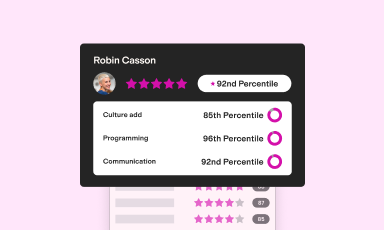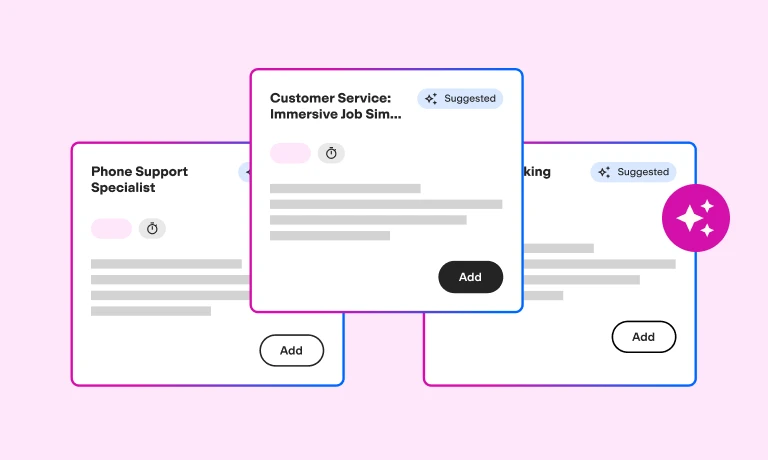Evaluating language skill levels for recruitment: A hiring manager's guide
Soft skills like communication and language proficiency are finally getting the attention they deserve, especially in today’s global and increasingly remote workforce.
But here’s the catch: Many recruiters don't understand that different jobs need different levels of language proficiency and often look for exceptional fluency, no matter the role. While this is a must for high-stakes jobs like content writing or healthcare, it’s overkill for many other roles.
The result? You overlook top talent who could have excelled in your company while smarter competitors snag the best folks.
Luckily, there are easy ways to avoid this, by using CEFR-aligned language proficiency tests.
Below, you’ll learn how to evaluate which language skill levels are required for various jobs. Plus, we’ll share top tips to help you find and hire candidates with the exact degree of fluency you need.
Table of contents
Overview of the CEFR framework
The Common European Framework of Reference for Languages (CEFR) is a system used to describe how well a person can understand and speak a target language. Developed by the Council of Europe in the 1990s, the CEFR created a standard way to describe language ability, which is now used globally.
Before this, different countries and institutions used their own guidelines, which were subjective, inconsistent, and confusing.
But now, everyone’s on the same page. Candidates can understand what language level a job needs and learn accordingly. Meanwhile, employers can use this shared scale to objectively compare candidates’ language skills, leading to better hiring decisions.
How does the CEFR system work?
The CEFR looks at key capabilities, such as writing, reading, speaking, and listening, and breaks language skills down into six levels with progressing fluency. This includes:
A1 (Beginner): Understand and produce basic phrases and introduce themselves.
A2 (Elementary): Handle simple communication and frequently used expressions.
B1 (Intermediate): Interact with others while travelling and produce simple text in familiar matters.
B2 (Upper intermediate): Hold detailed conversations and understand complex ideas in familiar contexts.
C1 (Advanced): Express themselves fluently on complex subjects, including for professional purposes.
C2 (Proficient): Understand and express themselves like native speakers on virtually any topic effortlessly.
In theory, the framework is language-agnostic, meaning it can be applied to any language. In addition to English and EU languages (such as French, Spanish, Dutch, Polish, etc.), the CEFR system is also used for Arabic, Russian, Japanese, Korean, Hindi, Mandarin, and other international languages.
Detailed analysis of CEFR levels
The six CEFR levels are categorized into basic, independent, and proficient users. Here’s how each language level translates into capabilities and job types at work.
Basic users
These beginner-level speakers can understand and use the target language for simple interactions and routine tasks. While basic users have limited fluency, they can function well in structured, low-stakes jobs with repetitive tasks and predictable language needs.
Level | User characteristics | Types of roles |
A1 | At work, A1 users follow simple instructions, recognize common words, basic phrases, and everyday expressions, and rely heavily on repetition or visual cues. Their responses are typically limited to rehearsed phrases. | A1 users are suitable for roles that involve routine, structured tasks and minimal social interaction. Think warehouse workers, kitchen assistants, and housekeeping staff, where employees only need to understand health and safety instructions or communicate basic needs. |
A2 | A2 users understand simple sentences and frequently used expressions in their field of work. They can ask and answer basic questions about familiar matters and follow straightforward written instructions or verbal directions. | Security guards, delivery drivers, and cleaning crew roles are suitable for A2 users. These jobs require slightly more direct exchange than A1-type roles, such as confirming an address or reporting incidents, but should steer clear of complex subjects or abstract discussions. |
Independent users
These levels of language users have a solid grasp of the target language. They’re comfortable working in moderately demanding environments that need cross-team collaboration and regular interactions with customers. Plus, they can handle a wider variety of situations, including unexpected issues.
Level | User characteristics | Types of roles |
B1 | These users can tackle routine work communication and deal with slightly more nuanced situations within familiar contexts. B1 users can also follow instructions and write simple reports and emails on familiar topical issues without help. | Customer support agents, front desk staff, and retail associates can perform well at B1 proficiency levels. These jobs need employees who can help customers resolve basic problems, read and understand product or policy documents, and handle familiar complaints. |
B2 | Capable of holding conversations on technical and abstract topics, B2 users can express views clearly, including providing explanations for opinions, understanding complex concepts, and handling unexpected questions. | A B2 proficiency level works well for sales representatives and project coordinators who must lead discussions, collaborate with colleagues, negotiate with clients, and deal with unfamiliar scenarios and complex situations. |
Proficient users
At these advanced levels, speakers are fluent and confident in dealing with even the most complex situations and tasks. They can express themselves accurately in high-stakes scenarios, adapt their tone to different audiences, and effortlessly understand subtle cues and shades of meaning, just like native speakers.
Level | User characteristics | Types of roles |
C1 | These speakers express ideas fluently and spontaneously without much obvious searching for expressions. C1 users understand a wide range of topics and can produce well-structured and detailed written communications and reports. | Recruiters, HR professionals, and consultants are examples of employees who could succeed with a C1 level of proficiency. These roles require the ability to lead complex discussions and presentations, persuade internal and external stakeholders, and take a nuanced approach to different contexts. |
C2 | At this level, users understand everything they read or hear. They can summarize information from different sources, reconstruct arguments and accounts, comprehend implicit meanings, and express themselves coherently on any topic.
| This highest proficiency level is well-suited to high-stakes roles, such as senior executives, writers and editors, lawyers, private bankers, and healthcare professionals, where poor language skills can result in financial, legal, or reputational risks. These jobs require understanding complex text, interpreting highly nuanced information, negotiating contracts, and representing companies publicly. |
The best insights on HR and recruitment, delivered to your inbox.
Biweekly updates. No spam. Unsubscribe any time.
Incorporating language proficiency into job descriptions and interviews
Language skills can make or break how well someone performs in a role. Imagine hiring an incredible product manager who can’t precisely articulate their needs to developers – it just won’t work. That’s why you must weave language checks into your hiring process right from the start. Here's how you can do this:
Job descriptions
Be upfront, clear, and specific about language requirements in your job descriptions. Importantly, link language requirements to the tasks candidates perform at work.
Instead of writing, “We’re looking for a Spanish speaker,” try, “Must have at least a B2 level proficiency in Spanish. You’ll be expected to write internal emails, respond to customer queries, and collaborate with team members in Spanish.”
This helps paint a picture of how a target language will be used day-to-day, sets the right expectations, and filters out mismatched applicants right off the bat.
Interviews
Interviews are also a great opportunity to assess candidates’ language skills further. For example, if you need someone with C1 French proficiency, use practical tasks such as asking them to explain their previous job as if they were training someone new, have them summarize a short document, or ask them to draft a sample email on a relevant topic in French.
Moreover, simply observe how they communicate generally during the interview, including in other questions. Pay attention to their:
Clarity: Are they easy to understand?
Vocabulary: Are they using the right terminology for the role?
Fluency: How much do they pause or search for expressions?
Structure: Can they express their ideas smoothly and logically?
While this gives you a good sense of your candidates' communication skills, note that it's not foolproof. Interviews are still subject to biases. Further, interviewers may not be trained to judge language ability accurately and, in some cases, may not even be fluent themselves.
To avoid the guesswork, use standardized language assessments with platforms like TestGorilla. Our language proficiency tests let you quickly and accurately measure CEFR language levels so you can shortlist and interview only the most qualified candidates.
How recruiters can use TestGorilla’s language tests
TestGorilla’s extensive library of language tests uses the CEFR framework and covers A2 to C2 testing in 15 languages.
Tip: Add up to five tests, including our language tests, hard, soft, and cognitive skills tests, and personality and culture tests, into a single assessment for a well-rounded view of your candidates’ capabilities beyond just language.
Special considerations in language proficiency by language
While CEFR levels apply to any language, there are a few nuances to keep in mind depending on your target language.
Grammar complexity can vary
Languages like German have tricky grammar rules, so a candidate who successfully passed a German B2 (Upper Intermediate) test might understand spoken content but struggle to draft an email free of grammatical errors.
If this is the case and your candidate is skilled in every other aspect, consider some extra time or support to help them refine these skills. Alternatively, be lenient if writing isn’t a major part of the job.
Culture matters
In most languages, how you speak can matter as much as what you say. For instance, a C1-level English-speaking salesperson might confuse a potential client by using overly formal or flowery words like “I desire to converse with you,” instead of everyday phrases like “I’d like to talk to you.”
Our tip? Use an English C2 (Proficient) test to screen for essential skills, followed by role-play scenarios to look out for cultural context during interviews.
Some languages don’t have widely available tests
If you’re hiring for roles that require less commonly used languages like Swahili or Pashto, consider partnering with native-speaking assessors and use practical tasks to assess candidates’ communication skills. Similarly, if you just need to test someone’s spoken Urdu skills, a Hindi C1 (Advanced) test can suffice as the two have similar spoken vocabularies.
Don’t get bogged down trying to fit candidates into a CEFR box. Instead, focus on whether they’re “good enough” for professional purposes.
Identify the ideal candidate for your team
As companies go global, outsourcing grows, and remote work becomes the norm, assessing candidates’ language skills is more important than ever. But to get it right, consider what language level a role truly needs and specify it in your job descriptions.
Next, assess language skills properly. Use language assessments or bilingual skills tests, like TestGorilla’s, to shortlist applicants proficient in the language you need, at the appropriate level. Finally, use interviews to dive deeper into communication skills so you can hire someone who fits the role like a glove.
Like what you're reading? Get a demo to explore TestGorilla's CEFR-aligned language tests and other hard and soft skills assessments today.
You've scrolled this far
Why not try TestGorilla for free, and see what happens when you put skills first.




















